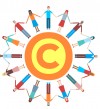
The ALAI Congress 2017 was held at the University of Copenhagen on 18-19 May 2017. Ruth Towse was invited to take part and present in the panel on Economics of copyright. Here is professor Towse’s report on the Congress.
The ALAI (International Literary and Artistic Association) 2017 conference, title ‘Copyright, to be or not to be’, met in the main hall of the University of Copenhagen on two hot sunny days. The conference title was intended to indicate that the topics for discussion were about the survival of copyright. Given the participants – law professors and practitioners of various kinds – there was little doubt what the conclusion would be. There was much quoting of Shakespeare, though no-one mentioned that he had not had the benefit of copyright!
The conference consisted of 4 blocks of panels over the 2 days. There is a lot of emphasis on national reports on the various topics in each session, which were summarized at length by a moderator, a rapporteur and a co-rapporteur, leaving not a lot of time for each panellist’s contribution, though there was a reasonable amount of time for discussion between panellists and questions from the floor.
The panel I was on was to discuss ‘Economic aspects of copyright and related rights’ and for guidance, we were given the following statement:
‘Based on a common methodology, there is now much quantitative research regarding the economic aspects of copyright and related rights in different countries. What significance does that have for maintaining and further developing the system of copyright and related rights?
More recently, attempts are being made to establish a methodology for a qualitative assessment of copyright and related rights. What are the results so far, and are they pointing the same way as the quantitative research? If copyright and related rights are beneficial, who is benefitting? There are many interests at stake, authors, performers, producers, publishers, disseminators, users, ISPs, Telcos, users, the general public. How are their economic interests balanced against each other? How can such quantitative and qualitative information be used to guide policy-making on copyright and related rights?’
Needless to say, I could have spent the whole session evaluating it!
The moderator: Dr Mihály Ficsor from Budapest has a long history of working with WIPO. The Rapporteur, Mr. Jukka Liedes, Helsinki, whom I knew from the week I spent in 2000 working on the WIPO Guide on Surveying the Economic Contribution of the Copyright Industries. He is the instigator of a recent attempt to itemise all sources of copyright revenues in Finland; however, he was unable to take part due to illness. Instead, we had a very good introduction from Co-rapporteur: Professor Alain Strowel, Université Saint-Louis and Université catholique de Louvain.
The panellists: Professor Paul Goldstein, Stanford University, Palo Alto
Professor Jan Rosen, University of Stockholm
Mr. Alexander Cuntz, WIPO, Geneva
Mr. Ted Shapiro, Wiggin LLP, London
Dr. Stef van Gompel, Institute for Information Law, Amsterdam and myself.
I had expected to be the only economist there but Alexander Cuntz is the new economist at WIPO and he outlined several of the projects they are planning to do. He has been planning a study on royalty income distribution with Christian Handke (which I am to be invited to join).
We had been asked to circulate a paper in advance so I sent round my paper ‘What we know, what we don’t know and what policy-makers would like us to know about the economics of copyright’ published in the Review of Economic Research on Copyright Issues (and SSRN) in December, 2011. However, we were under such tight time limits that I did not attempt to go into it fully (to the disappointment of Moderator Ficsor who thought it would stir up a storm) and presented the following points.
Facts and Evidence
- Facts do not speak for themselves; they need interpretation to become evidence. The economic hypothesis = copyright leads to greater output of creative works.
- Research on the creative industries provides data on the contribution to National Income and growth of the list of industries which produce copyrightable goods and services but it does not provide evidence on the incentive copyright played in their production.
- We cannot say from that data that greater protection would increase output. For that you need to investigate the effect of changes in copyright eg extension of term of scope on output. Research measuring piracy has basically done that.
- Copyright is very difficult to research empirically: automatic, no registration no data source. Need data for 50/70 plus years for total income.
- Surveys of firms asking them how they use copyright have been done as well with no clear result (and by the way, the same if true of patents and innovation).
- The policy objective of copyright as a vehicle for innovation/creativity and economic growth a political choice. Copyright is always a trade-off between incentive and access; balance is political.
- Policy should be based on evidence – not evidence based on policy.
Economics of Copyright
- The bugbear of being an economist is that the perception of economics research is that it is all about providing data. It is not even always concerned with evidence.
- Economists are interested in the structure of markets for creative goods and services and their regulation. Copyright is an aspect of market regulation. Markets have changed due to digitization and internet distribution and with it the need for regulation.
- I got interested in copyright because I have worked on artists’ labour markets – earnings, employment, careers and so on. I believe that copyright is needed but the data shows it typically only provides a peripheral source of earnings to authors and performers.
- Surveys of artists (authors and performers, craftspeople and so on) have shown they value moral rights and copyright as the confirmation of their professional status often more than the expectation of financial reward. Ie, intrinsic motivation.
- Moreover, copyright is not the only policy for promoting creativity eg grants, prizes etc. Also cultural markets differ eg subsidy, state involvement in production.
- The big question from my standpoint is: does copyright act as an incentive to primary cultural production? We don’t know. It takes behavioural research to find out how creators use copyright and respond to any changes.
- What we do know that copyright has become built into the business models of intermediaries who are reluctant to change.
Policy issues
- Terms of contracts are more important than altering copyright law. I question if copyright law is the best vehicle for that (eg in the Digital Single Market Directive).
- Bargaining power of most primary creators and performers is relatively low due mostly to excess supply in labour market.
- Self publishing has improved bargaining position for those with some success. Having track record of self publishing solves the information problem (risk) of the intermediary who is willing to offer better terms to author.
- Digitization also has lowered costs of production and especially of marketing and distribution. It has led to an increase in the output of books, films and music. This reduces the case for the copyright incentive.
I’m glad to say it was well received and that several questions were asked form both panellists and the audience. It is clear that the message about evidence and the case for the economics of copyright is by now pretty well established. It was also very nice that quite a few people came up to me and said they have read my work. Good to know one does not entirely waste one’s time!





